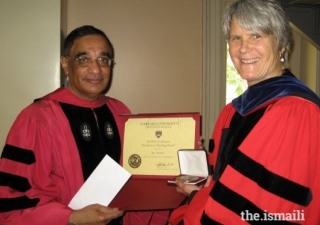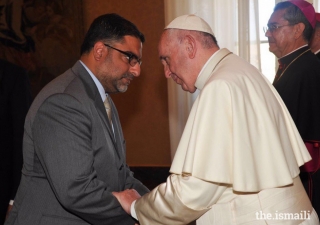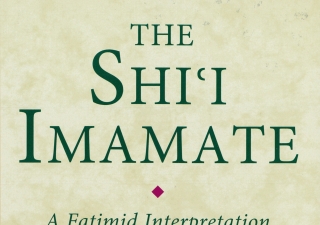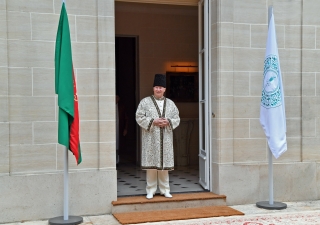Learning & Inspiration
The acceptance of the Imamat as an institution going back to the earliest days of the Islamic tradition, the use of the intellect and ethical behavior, are cornerstones of the of the Shia Ismaili Muslim tariqa. The articles and books included here, and added to periodically, will inform the readers and reflect the source of inspiration for many of the activities of the Ismaili community.
During the program Peace it is, Until the Break of Dawn, Al-Waez Najeeb Haidary shares a perspective in Farsi on “Significance of Laylat al-Qadr.”
During the program Peace it is, Until the Break of Dawn, Al-Waeza Dr. Natasha Hakimali Merchant shares a perspective on “Transformation Through Disruption.”
The internal divisions of the Shi‘i community - as highlighted in the first part of this article, which was published in the last edition of The Ismaili USA - can be traced to the dispute over the succession to Imam Ja‘far al-Sadiq (d. 148/765 CE). After his death, the majority of his followers eventually recognized his son Musa al-Kazim (d. 183/799 CE) as their next Imam. However, the other Shi‘i groups acknowledged the Imamat of Musa’s eldest half-brother Isma‘il, the eponym of the Isma‘ili Shi‘ia, or his son Muhammad b. Isma‘il as successors to the Imamat. Little is known about the life and career of Muhammad b. Isma‘il, the seventh Imam of the Isma‘ilis, who went into hiding, initiating a period of concealment (dawr al-satr) in early Ismaili history. This period of concealment lasted until the foundation of the Fatimid caliphate when the Ismaili Imams emerged openly as Fatimid Caliphs. Henceforth Imam Muhammad b. Isma‘il acquired the epithet al-Maktum (the hidden one), in addition to al-Maymun (the fortunate one).
Lavishly illustrated and written in a style accessible to all, Islam: An Illustrated Journey tells the story of Islam. Beginning in the world of late antiquity and the pre-Islamic period, the book takes the reader through Islam’s formative era and early development in the Arabian peninsula, the rise and decline of its major dynasties, including the Umayyads, Abbasids, Fatimids, Mughals, Safavids, Ottomans and finally up to its place in the modern world.
Shi`i Ismaili Muslims are unique in following a living, hereditary Imam (spiritual leader), whom they believe to be directly descended from the Prophet Muhammad (peace be upon him and his family). The Imam's duty has been to guide his community with Islamic principles that apply to the needs of the time. In this insightful book, M. Ali Lakhani examines how the ideas and actions of the current Ismaili Imam, and fourth Aga Khan, Prince Karim al-Hussaini, provide an Islamic response to the challenges that face Muslims in the modern era.
The.Ismaili brings you Sahil Badruddin’s interview with Karen Armstrong, an internationally acclaimed scholar and bestselling author of numerous books on religion. She won the 2008 TED Prize launching The Charter for Compassion, which has over two million signatories. She discussed her insights on compassion, the Golden Rule, nationalism, materialism, cosmopolitan ethics, religious literacy, the future of religion, perceptions of religious people, religious institutions, personal search, and her vision for the future.
The.Ismaili is pleased to bring you Sahil Badruddin’s interview with Dr. Ali Asani. He is a Professor of Indo-Muslim Religion and Cultures, the Director of the Prince Alwaleed bin Talal Islamic Studies Program at Harvard University, and part of Harvard’s Online Religious Literacy Project. He discussed his insights on the necessity of religious literacy, Harvard EdX and online courses, intellectual diversity and pluralism, rise of the non-religious in America, media, storytelling and perception of Muslims, nationalism, Harvard’s courses on Shi’ism and Ismaili Thought, and his vision for the future.
Professor Hussein Rashid discusses his work, perceptions of Muslims, cosmopolitan ethics, attitudes towards faith, materialism, and religious and cultural literacy.
The Tathbit al-imama attributed to the Fatimid Imam-Caliph al-Mansur (334–341/946–953) is an important early Ismaili treatise on the legitimacy of the Imamate of ʿAli b. Abi Talib and that of the Ismaili Imams from among his progeny.
A Jamatkhana is a designated space for Shia Ismaili Muslims to gather and perform tariqah practices, such as supplicatory prayers - du‘a, meditative sessions of remembrance - zikr, and the recitation of devotional poetry, such as ginans and qasidas.
Excerpt from Mawlana Hazar Imam, addressing the leaders of the global Jamat at his residence, Aiglemont, France, July 11, 2017













